Ok, Civ 6 is out now and nobody cares about 5 any more, but I'm still finishing some business here.
During the Greece game, a new approach started forming in my mind. With Poland and Greece, I saw how the run down the left side of Liberty worked great for expansion. But it still took a bit too long to settle all the cities and I lamented the mistakes stemming from that: missed the Pyramids, Chichen Itza, and still got to the National College too late to help Education which didn't come any sooner.
Then I realized this. You don't need to get every city out as fast as possible. Just the ones that will produce a Great Scientist. Only they need to build that university as soon as possible. Cities beyond that can take their time up the development curve. They aren't even really needed to be at full strength until after research labs, in fact. The purpose of non-GSci cities is only to provide endgame beakers for more bulb yield; they really don't do anything else relevant along the way.
So the key idea here is two stages of expansion. First expand to six cities as fast as possible. Then pause for the Pyramids, National College, probably Petra, maybe even Chichen Itza. Then finish expanding out to all the rest of the cities. Cities 2-3 will have some time for workers and archers; cities 4-6 will expect to go library first both for their own research and to enable the NC. The research from all the libraries and NC should speed up Education.
More aspects of this plan: 1) I will plan to buy the capital's library along the way. It's less efficient hammerwise than buying workers, but not by much, and the capital's build queue is the critical path to all of this and that is the one way to accelerate that. 2) This also answers the question of when to research Engineering: after Education. The first wave of cities will be up to size and not desperate for aqueducts before universities; the second wave will not be desperate for universities and will want the aqueducts up the growth curve. 3) Happiness should be fine to manage by stopping at six cities, and then the later ones will come after we have a few CS allies.
And I need to make one more adjustment for a Liberty game plan. I need to hit the Renaissance sooner for the 8th social policy or Oracle to go into Rationalism, in order to save the Liberty finisher for an endgame scientist. I wrote before how you get exactly enough policies to finish Tradition/Liberty, Mercantilism, Rationalism, and Order. You can't spend a 9th policy outside Tradition/Liberty/Mercantilism or else you won't finish everything by endgame. But delaying the Liberty finisher leaves a policy hole that can only be filled later if you start on Rationalism one sooner.
My best science games in G&K did that, slinging both the 8th policy and Oracle all the way into Rationalism. This hasn't been possible in BNW because expansion is slower without river gold and AI loans, plus the per-city tech cost penalty. But I'm going to try to find a way here.
The 6-city library and NC plan might be enough to get to Rationalism fast enough. But I'll add one more piece: Korea and their capital research bonus ability. I've been saving Korea for later in this run of games when I'd know the best way to put them to use, and now is the time.
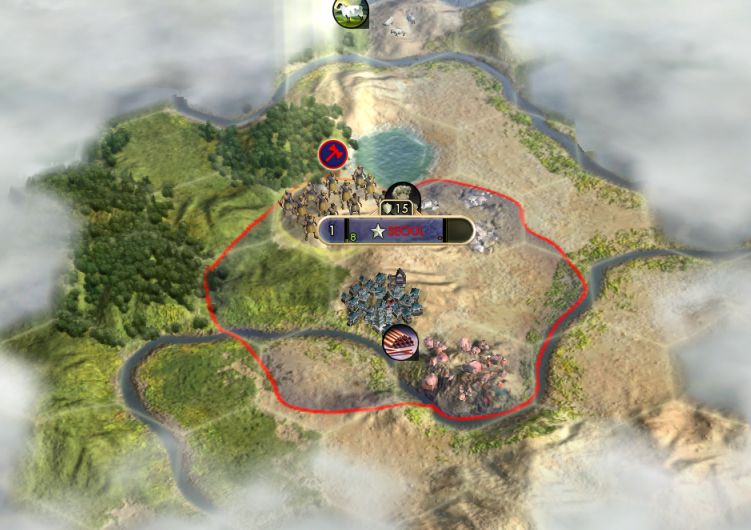
This is an example of a start that I'll play out a little ways. Not spectacular but there's enough to work with, with a hill luxury and marble. There's no 3-yield tile which is a significant setback on growing and producing scouts. When this happens, I work the hill luxury at size 1 with no growth, and just go out to see if ruins can grow me to size 4 instead.
Of course, if you're reading this report, you know that the ruins went my way. I got 50 gold on turn 3, t6 Pottery, t7 got the survivors to 2, barbs, t13 culture.
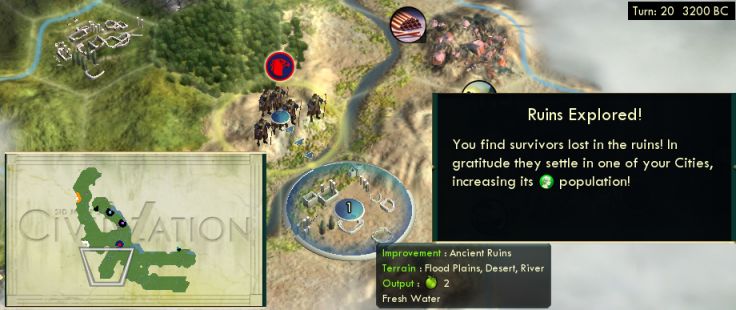
On turn 20 exactly I was set up to hit three ruins. Didn't get the faith pantheon yet, but a good haul anyway in a helpful map, population to size 3, and Sailing. More over the next few turns yielded an archer upgrade, another map, and Masonry. Still nice, but I was getting worried about the faith...
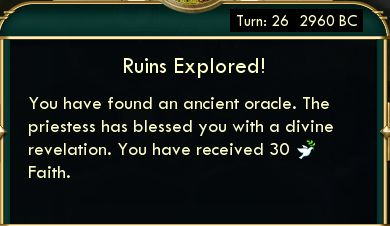 ... but then the ruins spun some big jackpots. Got the faith on turn 26, then faith again towards the religion on t30, t31 survivors to size 4, t33 culture for Collective Rule just as I would start building settlers, t37 survivors to size 5. Later still I'd get survivors to take an expansion city to size 2, Calendar, and one more big faith.
... but then the ruins spun some big jackpots. Got the faith on turn 26, then faith again towards the religion on t30, t31 survivors to size 4, t33 culture for Collective Rule just as I would start building settlers, t37 survivors to size 5. Later still I'd get survivors to take an expansion city to size 2, Calendar, and one more big faith.
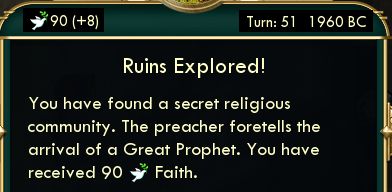 That last was unusual, as it came just after my first prophet had already spawned. It was worth 90 faith rather than the usual 60. I guess the rule is 30% of your current next prophet, or maybe 33% that gets truncated to the nearest 10.
That last was unusual, as it came just after my first prophet had already spawned. It was worth 90 faith rather than the usual 60. I guess the rule is 30% of your current next prophet, or maybe 33% that gets truncated to the nearest 10.
My starting build order went 4 scouts - monument - archer - settlers. Tech was Mining first, then all the first level techs (popped Pottery), then Bronze to find iron. Then Writing for the libraries, then Wheel - Math - Currency to do Petra.
Policies: t13 Liberty opener by culture ruin, t22 Republic, t33 Collective Rule by culture ruin, t53 Citizenship.
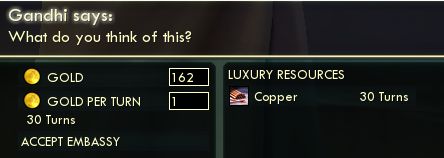 It felt like everything went slightly slow but nothing went breakingly slow. I got my first worker purchase on turn 25 (I figure t18 is about the median), first luxury sale on t36 (about t27 is par), first AI friendship for a big cash sale and second worker purchase on t47 (average is maybe t40), first iron sale on t54 (average varies widely on this one.)
It felt like everything went slightly slow but nothing went breakingly slow. I got my first worker purchase on turn 25 (I figure t18 is about the median), first luxury sale on t36 (about t27 is par), first AI friendship for a big cash sale and second worker purchase on t47 (average is maybe t40), first iron sale on t54 (average varies widely on this one.)
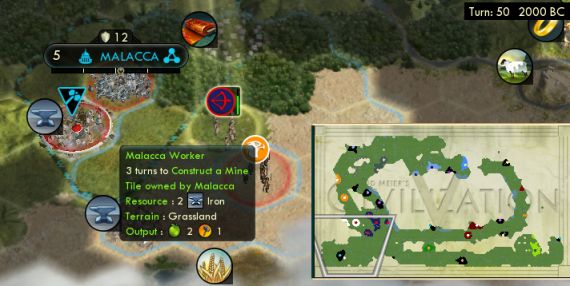 And a city-state worker steal on t50 (average also around t40). And as usual I stayed at war long enough to swipe a second one about another 40 turns later.
And a city-state worker steal on t50 (average also around t40). And as usual I stayed at war long enough to swipe a second one about another 40 turns later.
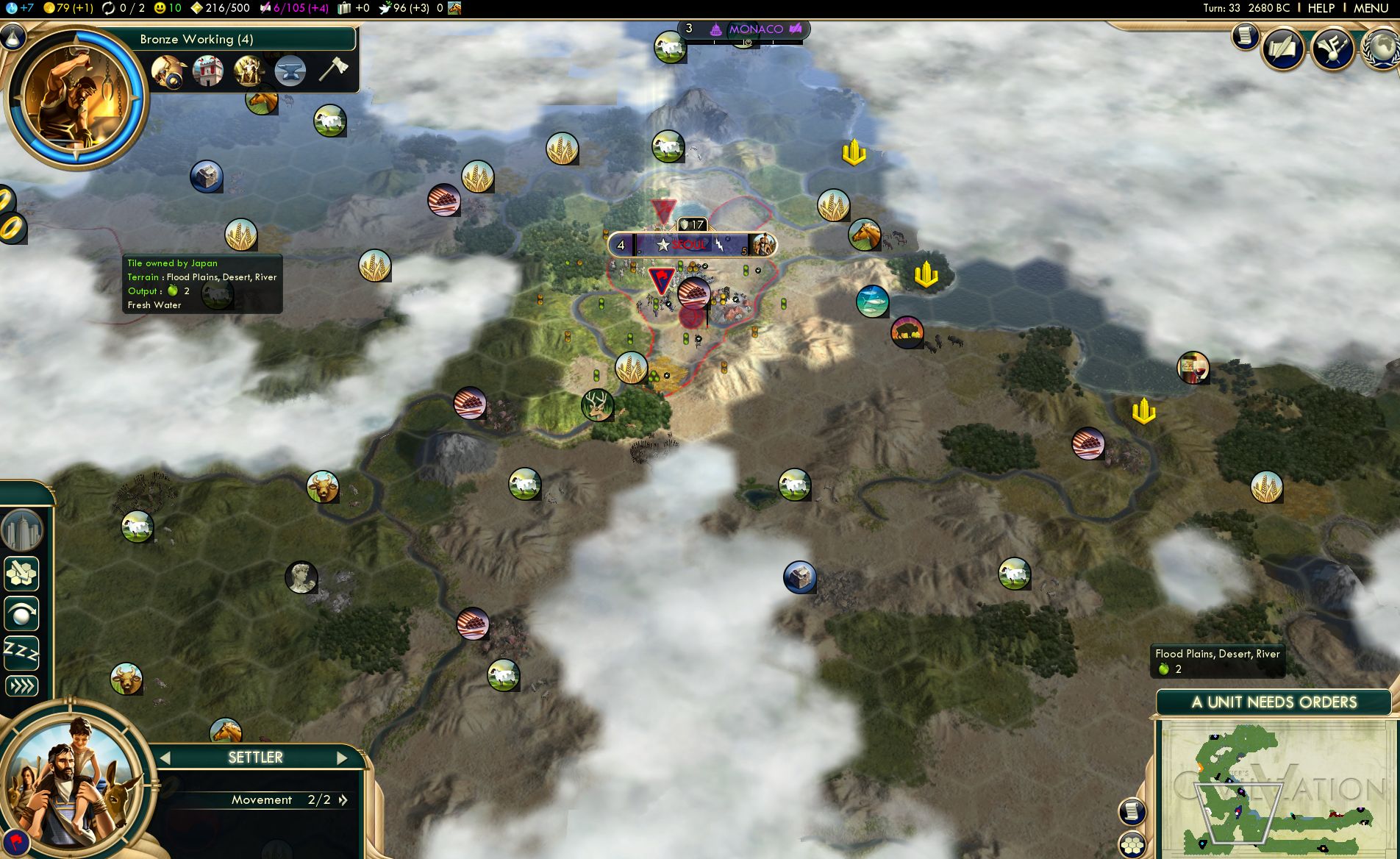
So here's an overview as the Collective Rule settler hit and we started building them. I've got a good backyard of space towards the southwest corner, although will have to settle towards Japan early. Enough desert and luxuries to work with, and also some coastal space for cities to get sea trade routes.
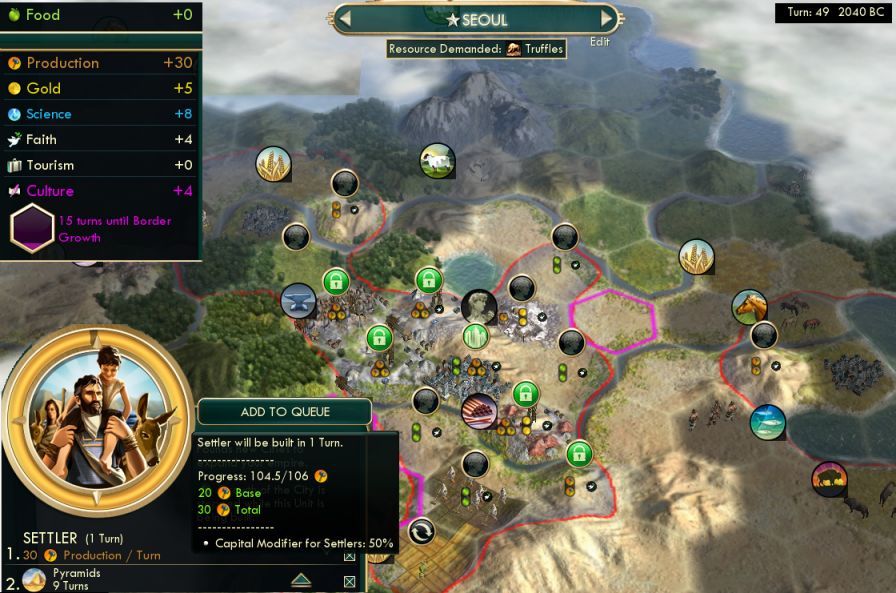
Also here's a look as the last of the first wave of settlers comes out, with a few notes. Iron had appeared here at the capital, nice to quickly sell, but also to get the tile picker to choose a hill without having to buy it. I had bought the desert hill to the south. But also notice how the other city to the east sneakily captured another desert hill just inside the capital's range.
And one more note here is how Civ 5 handles overflow. It does not go through the steps of dividing by your previous modifier and multiplying by the next one, as in Civ 4. It just directly applies with no mathematical tricks. This means that all these +50% multiplied hammers from this settler will overflow onto the next item (Pyramids).
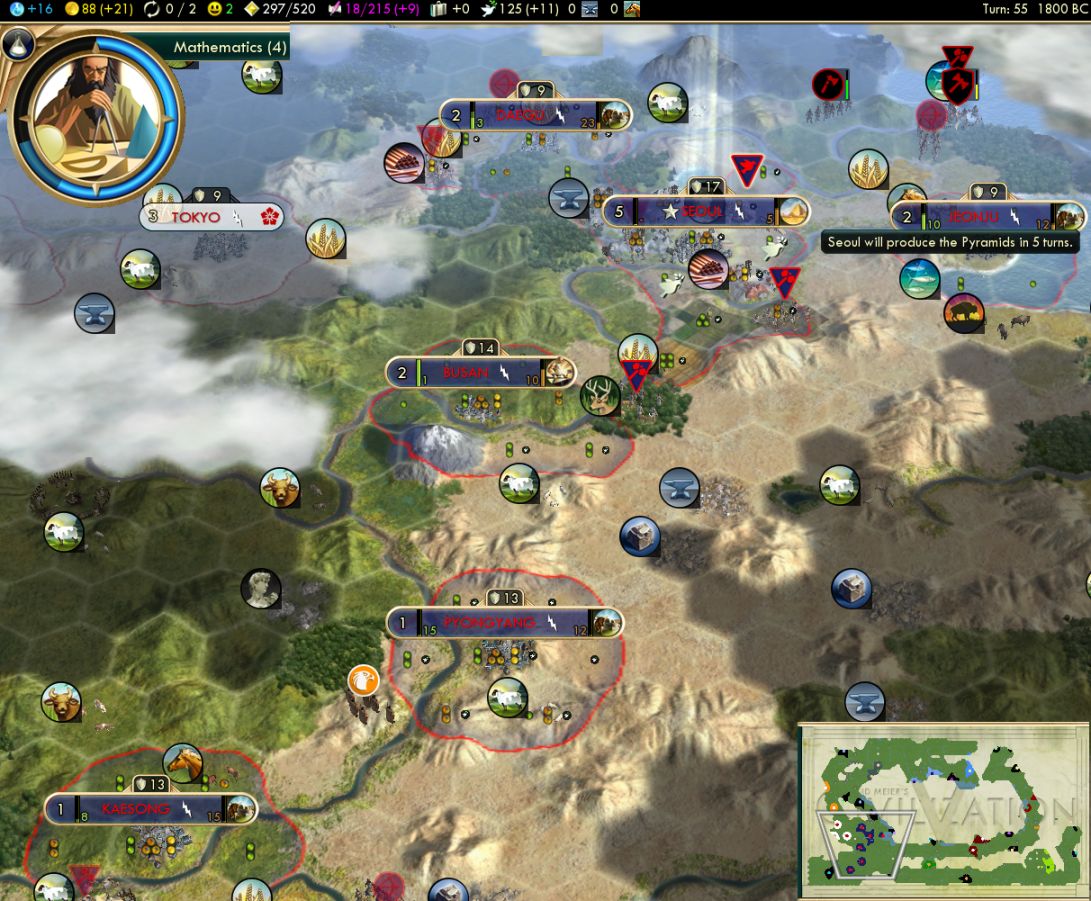
So here's the Chosen Six cities. As planned, these were the cities to build libraries to enable the NC, speed to Education, and build universities for the great scientists. More cities would follow only after the Pyramids, Petra, and National College. I had cleverly sent the settler for Kaesong ahead of the one for Pyongyang, so they'd get founded at the same time with neither lagging.
It turned out that the Pyramids and Petra and research to Philosophy took long enough that all the cities could build their granary before library. Republic really is strong to get cities off the ground quickly. It's not just the +1 hammer (plus the 5% which is 3 hammers total worth of value towards the granary), it's the snowball effect so early on the growth curve, completing that granary a good 10 turns sooner, an extra 20 food, half a city size.
Turn 58 Byzantium friended me and loaned me the money to buy Seoul's library as planned. This triggered Korea's research-boost ability, which I'm still not quite sure how it works in BNW. Used to be equivalent to a research agreement, but those were badly nerfed in BNW. It was about 80 beakers here but I don't know how that value came to be. Some time later, I also bought Seoul's watermill. That was the best item available for the money, since I didn't want a worker or settler at the moment, didn't need to buy any other of the libraries, and would push the limiting factor of all the early game development which was Seoul's build queue.
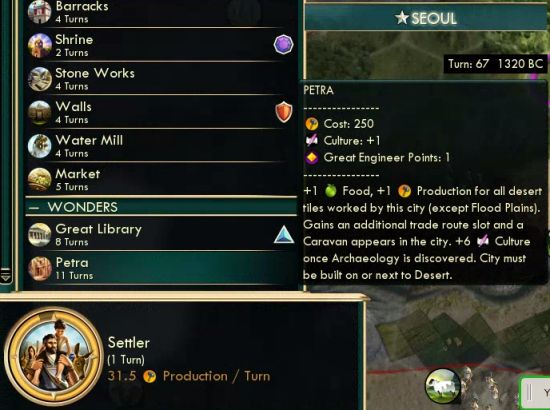
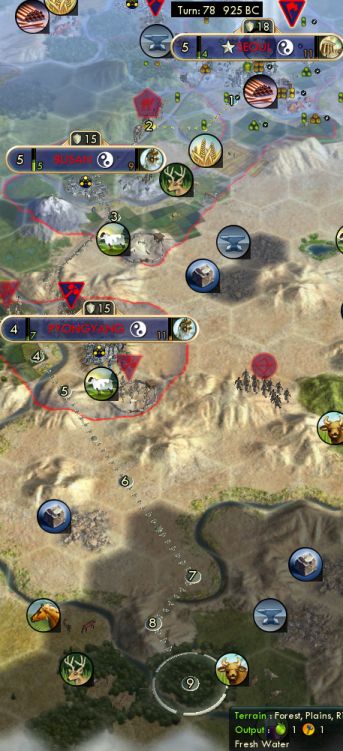
I pulled this bit of build queue micromanagement. First I brought a settler to just short of completion just as I reached Currency. Then I built Petra. Then finished that settler just before starting the National College. Reason was so this settler could do his long walk while the NC was under construction, then settle just after it was completed so the new city didn't need a library yet. Parallelizing dependencies like this is how you cut off turns, and where I still find fun in Civ 5 even now.
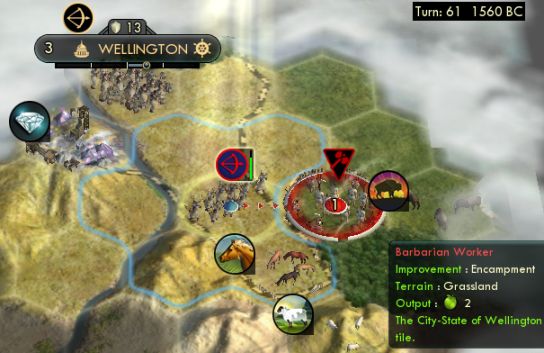 For the second straight game, I got an maritime ally from an opportune camp clear plus worker retrieval...
For the second straight game, I got an maritime ally from an opportune camp clear plus worker retrieval...
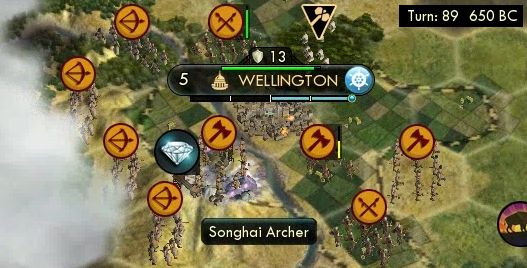 ... and for the second straight game, lost it to the Songhai attacking it. Okay, Songhai, you are fired from my list of selected AI opponents from now on. They'd been in because I thought their extra gold from conquest could play to my advantage, but not if they get that gold by killing my allies!
... and for the second straight game, lost it to the Songhai attacking it. Okay, Songhai, you are fired from my list of selected AI opponents from now on. They'd been in because I thought their extra gold from conquest could play to my advantage, but not if they get that gold by killing my allies!
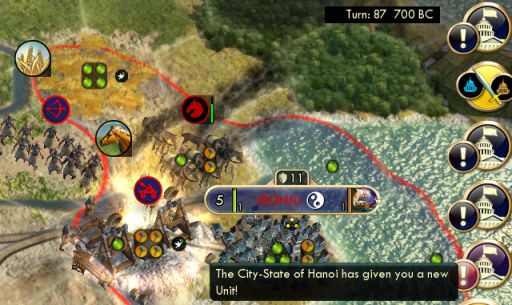 But speaking of city-states, this has to set a record for the most convenient militaristic unit spawn, a catapult at the exact time and place a barbarian horseman is attacking.
But speaking of city-states, this has to set a record for the most convenient militaristic unit spawn, a catapult at the exact time and place a barbarian horseman is attacking.
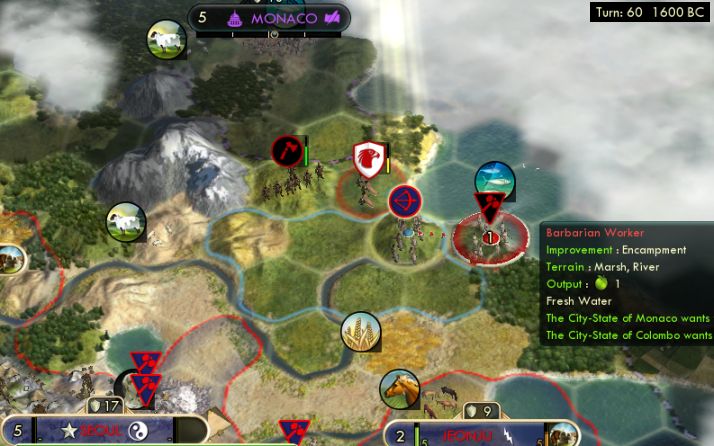
The war I had to fight now was to keep my culture as low as possible. First I deliberately passed on this camp quest. I didn't want the culture from Monaco and could live without happiness from mercantile Colombo.
Then I even sold Seoul's monument. (I hadn't built any others.)
Then I didn't do what I wanted on religion. I wanted to go for the enhancement prophet immediately. I didn't want pagodas yet - had enough happy and didn't want the culture. And the enhancement would bring Religious Community which would help Seoul, and Religious Texts to help pressure everything. But stupid Monaco also had a prophet quest in the queue! So I had to delay that too, and make my first religious purchase a missionary to spread that way.
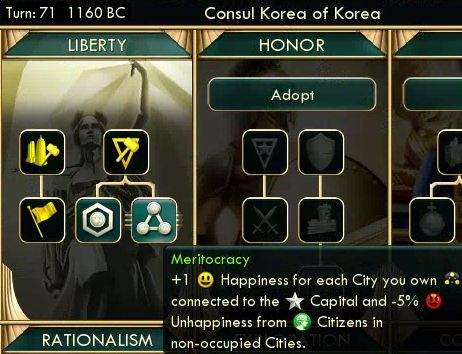
The reason for all this was to delay the 6th policy long enough for it to go into Commerce. This was critical, or else the one missing policy outside the track of Liberty/Mercantilism/Rationalism/ideology would be the bridge too far to complete them all.
So my 5th policy on turn 71 had to be Meritocracy. I wanted Representation, but couldn't take it, because the Golden Age culture and Rep's discount together would bring the 6th policy too soon. Also, Representation had the same problem here as for Greece - taking it now would waste the Golden Age by pushing the happy GA counter out of reach. And also Meritocracy worked better than usual this time, in that I was already connecting roads, thanks to a glut of worker labor stemming from the limited city count and the Pyramids.

Anyway, I won this war, by an ample margin. In fact I even had enough time to also fill in the prerequisites to reach the medieval era by the more useful Civil Service rather than Theology. The Commerce opener followed on turn 93.
I reached Education on turn 103. One turn behind my fastest mark, so I guess the two-phase expansion strategy worked alright. And the National College is already in place to get to Acoustics quickly.
Turn 104 I bought Seoul's university, to get the tech boost towards Acoustics. This was anemic, worth only 120 beakers, when my normal production was already at 100/turn. But Seoul's scientists were important too of course, kicking in Korea's specialist bonus multiplied by the National College.

I was one-more-turning like crazy late at night, raptly watching these numbers tick up. It's hard to convey in text how this goes turn by turn. I was really trying to reach Rationalism in time for one more policy here. It looked impossible with no way to speed up that research by a turn, but then the culture slowed down with one cultured CS friendship wearing off just in time. I kept my own culture production as low as possible, didn't build monuments, held off on pagodas, didn't hire writer specialists.

PERFECT! I came exactly ONE culture short just as Acoustics completed! Also I had timed the happiness Golden Age perfectly here too, preceded by Chichen Itza just in time as well. Oh, and would you look at that in Daegu, the Oracle is also just completing now too. Civ 5 still gives me thrills in doing this stuff, even though it's gamey number manipulation and isn't really civilization building, it's still fun.
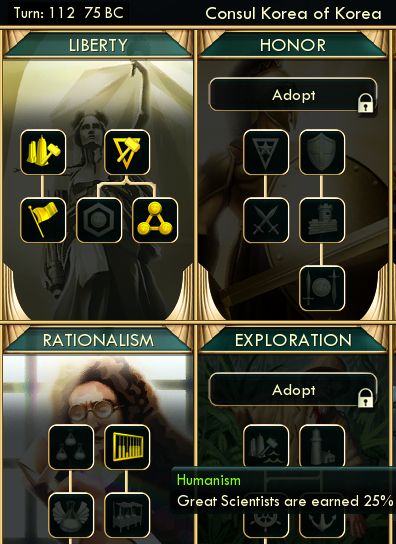
So I shortcutted Rationalism not just by one, not even by two, but by THREE policies! This is the 7th normal one. Usually 7 + 8 + Oracle all go into Commerce, but instead here I have all three of those going into Rationalism instead, claiming both the opener and Humanism right now on turn 112. Secularism would follow on t122 and Free Thought on t133, both just about at the limits of possible speed.

Well, here's one set of numbers that didn't go perfectly. The Great Engineer points from the Pyramids, Petra, and Chichen Itza added up and outraced the Scientist points at the capital. There isn't any way to slow or postpone the GE points or speed up the GS points. I saw a while ahead of time that this would happen (Chichen Itza didn't cause it or else I would have delayed/skipped it.) Of course the GE bumps the GS cost counter. It kinda sucks to scratch one scientist from endgame, but if anyone can make up for that, it's Korea.
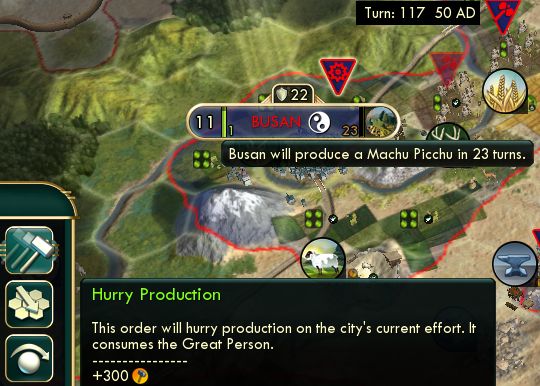
And the engineer went to a seriously important use anyway, rushing Machu Picchu. I didn't have a good way to build this. My only mountain city here was pretty low on hammers. And I could see a Dutch city already building it, so probably would have missed it without this occurrence.
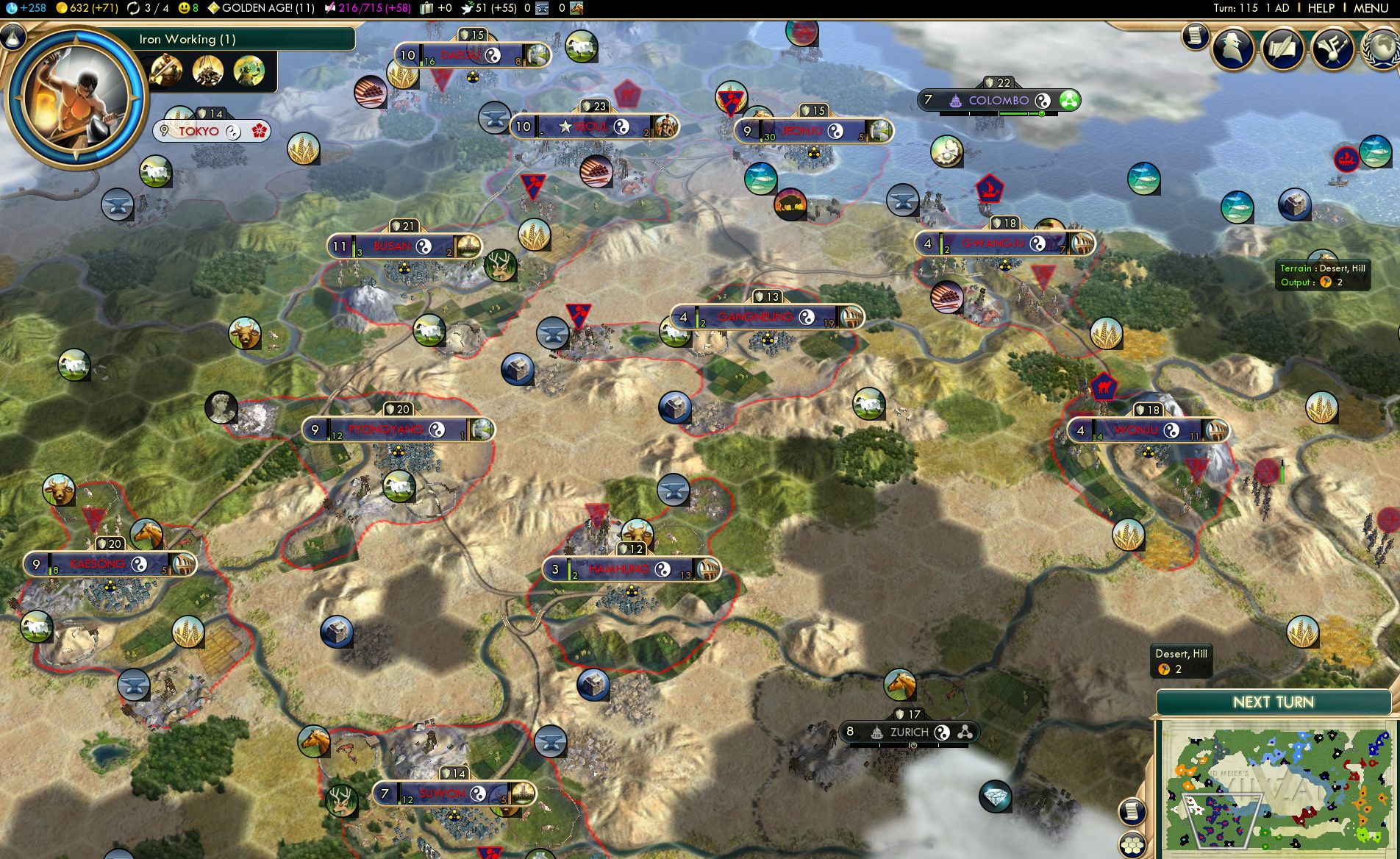
And the 1 AD overview. Finally starting to build aqueducts rather late. I was at 11 cities here, and decided to add one more on the coast at that indicated desert hill space on the right, since a coastal city can develop very quickly with sea trade routes.
One thing that's subpar is the size of the capital, only 10 here. As great as starvation settlers with Collective Rule are, the time spent not growing the capital is significant. It's also wasting quite a bit of Petra's potential by working flood plains for the growth rather than the hills.
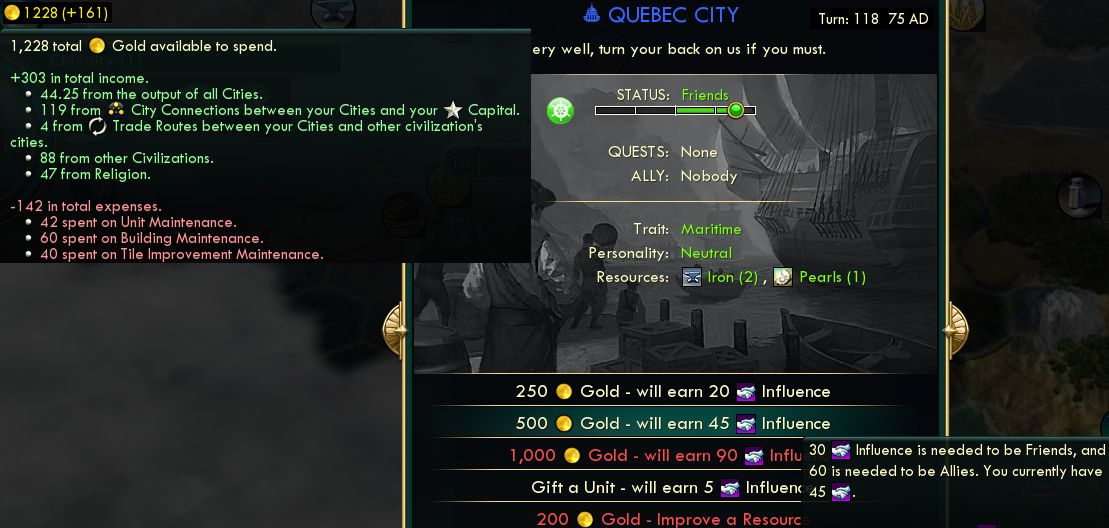
Part of why that happened was getting no maritime friends. The 3 food from each in the capital does matter. Presently I really wanted to save my money for schools, but caved to buy this one maritime ally. 11 food per turn times the rest of the game (I'd maintain the alliance with spy rigs) is worth 500 gold. Plus the pearls which was a unique luxury and triggered one WLTKD.
(Yeah, that's 88 income from other civs, that may be a record. I was selling something like 26 iron resources all for 2 gpt each. Point in favor of huge maps, more AIs to buy your stuff.)
I reached Printing Press on turn 128, exactly tied with the Greece game for the fastest so far. For once, I went World's Fair over Sciences Funding. Because I was so far in the hole on culture (deliberately by my own hand), and had no expectation for lots of cultured city-states, I didn't think I could complete all the policy and ideology trees needed. Sciences Funding produces no more than one extra great scientist; World's Fair would do the same if the policy made the difference on completing an ideology or Liberty which I projected would happen here. Also, World's Fair is somewhat more worthwhile if it comes earlier with some time to use the +100% culture.
And of course the AIs like the fair and hate Sciences Funding, and I could really use more friends to loan money, only had two. This worked in that Brazil also friended me soon.
Back home, I was developing as usual, built the universities in the original six core cities easily, and the second wave of cities developed up to them fairly quickly as well. This came to Scientific Theory on turn 143, along with a ton of other stuff happening at the same time.

Free Thought had come very early on turn 133, which meant it filled the sliding bulb window by turn 141. As per my recent research, bulbs can be spent regardless of your position on the tech tree once those modifiers are in place. So I spent my two scientists on Electricity and Radio to slingshot immediately from the industrial into the modern era.
I also took a Golden Age from the first Great Artist now, to synch up that multiplier with the industrial era cultured city-state value as usual. And because it was now 11 turns from the next great artist, remembering that you want to chain GAs without interruption to avoid getting gypped by how they end a turn sooner than the indicator seems to say. (Although this was actually a minor mistake. I forgot that the ideology tenet for GPP was coming and would speed up that artist, so could have done this GA a couple turns sooner, but no big deal.)
I bought one public school right away in the one scientist city that was lagging a few turns on GPP. There's also a policy available right here, which was Landsknects. Then I waited two turns and burned my first great writer to reach the next policy for Mercantilism. This was a loss compared to waiting for the maximum 8-turn value from that writer, but was necessary to get the discount on all those schools sooner.

Back to that modern age slingshot -- yes, this was to enable the ideology. And for once, I'll try out going Freedom instead of Order. Most commenters on my reports at CFC and Reddit think that going Order is baffling and Freedom is the only right choice. I don't agree, I think Workers' Faculties and Skyscrapers are both so much huger than anything in Freedom. Freedom's specialist enhancers look sexy but really don't do enough in the short time available. The food saver will only give about one extra growth in the 30 turns typical between ideology and endgame. And the anger saver is only about as much as Order's Socialist Realism. But I figured I really should try Freedom at least once. And while playing Korea is the perfect time to do it, if any civ wants to maximize specialists towards Freedom, of course it's Korea.
So I would buy a total of 7 schools, in the 6 scientist cities, plus one secondary city that was lagging and also had an observatory to build. I built the other five schools, and more on this topic in a bit.
I also spent my second great writer a bit early, 6 turns after the industrial GA instead of the full 8, in order to claim Universal Suffrage (half specialist anger) because I needed that right now after someone swiped away a mercantile ally with a bunch of happy.

I also built the Musicians' Guild, which I never do in the space games. But here I wanted the culture to keep climbing out of that hole, and also just for the two 4-beaker Korean specialist slots. The Great Musician himself had really nothing to do. I'd never build anything that would have a Great Work of Music slot, and with 0 base tourism, it looks like he gets a default strength of a pretty useless 100. Well, I went and had him tour India anyway, which accomplished exactly nothing, but amused me.
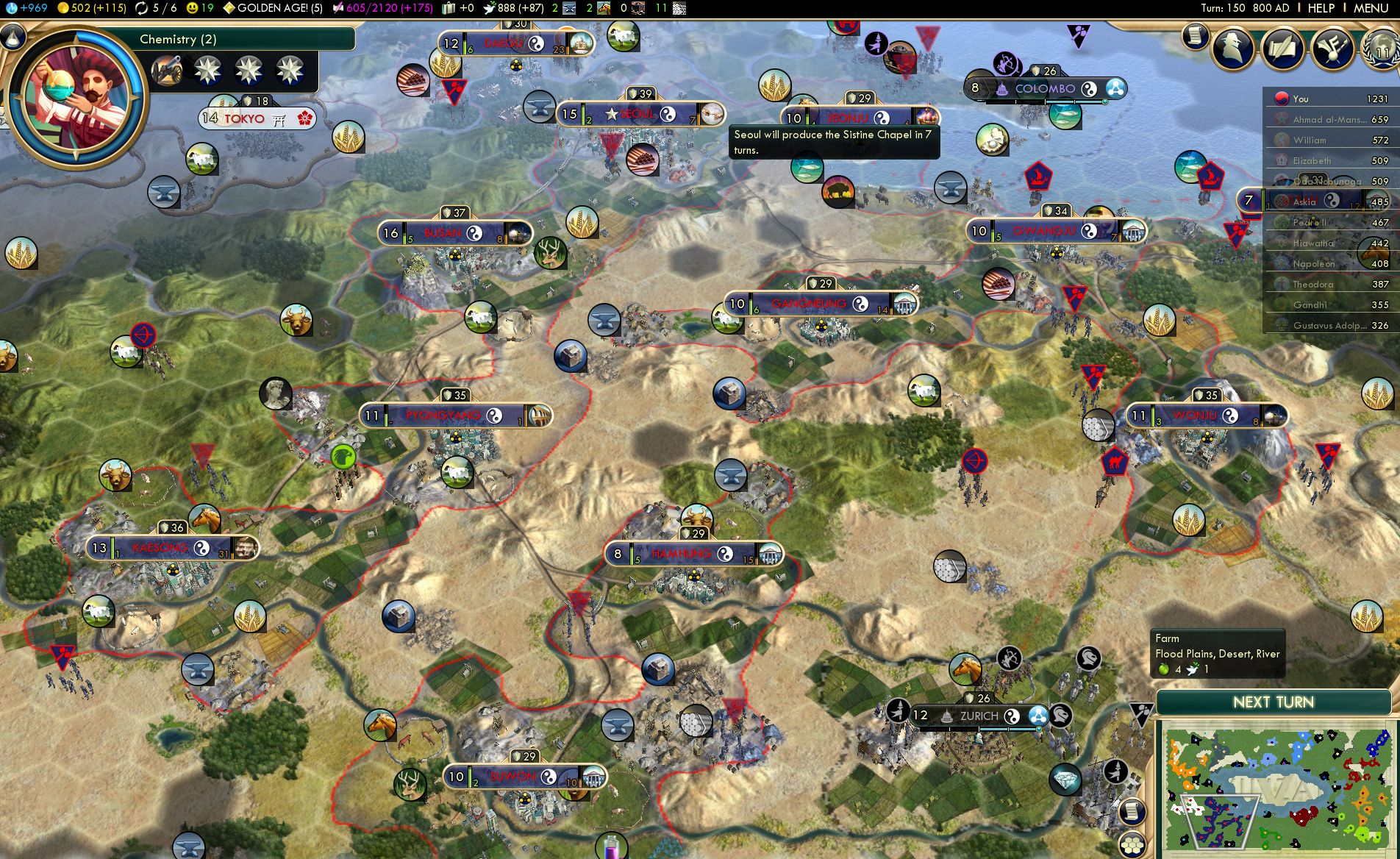
Moving along rapidly, here's the usual turn 150 overview. The report is moving along quickly because the game also did for me. I went the past 50 turns in just one evening, which is quite unusually fast for me, more typically I do about 20-25 turns in a day after the opening. That happened mostly because worker labor was pretty well set, with cities expanding slowly without Tradition and workers working fast with Liberty. Worker micromanagement is my biggest time sink; I also noticed that in Civ 4's Final Frontier mod, which I could also play quickly thanks to little worker micro.
Anyway, there's not a whole lot to report here. Just building all the midgame wonders spread out among the cities (Taj in Daegu, Globe in Kaesong, Porcelain next in Pyongyang after the aqueduct), since the capital was still pretty weak and there really wasn't much of anything else important to build after buying schools and finally building aqueducts. The later cities are building their own schools here so that we can save money for research labs.

Well, I picked the right map to skip Order and its need for factories. This was the only coal I could reach anywhere, and even that took waiting for a round of culture expansion from Jeonju.
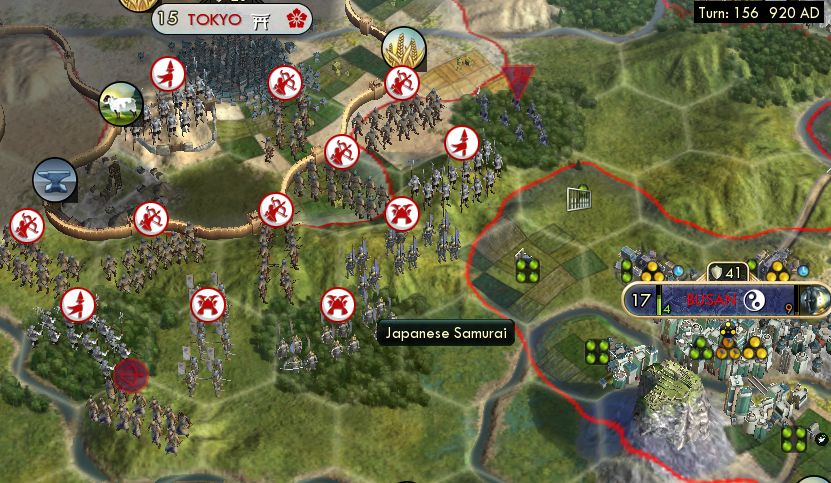
Incoming. Wow, that would take some effort to hold off. I could do it (just got Rifling), but would rather not have to blow money on units that should go into research labs.

Yes, let's pay that instead.
Turn 158 I spent two bulbs to reach Plastics. This was my earliest ever by four turns. Although that's not so much by playing well or by Korea's bonus, it's really because I spent four bulbs before this point and I think I've never done more than three before.
My late-game development went completely differently in this game than in any others thanks to Freedom. I bought only Seoul's research lab and built all the rest. And building those labs made me skip factories, hydro plants, even some workshops. I didn't have to build the factories and hydro plants because we didn't need to build SS parts. But I had to build rather than buy the labs in order to save money for spaceship parts under Freedom's Space Procurements. See, if you're going to buy any of Freedom's SS parts, you really have to buy them all, in order to finish the entire ship the moment you finish Apollo and the tech tree (which means Hubble since those are the last scientists to arrive.) If you build any of the parts, you're waiting for that 10+-turn construction process after Apollo, so the Freedom finisher isn't gaining you anything at all over Order.
Lacking the factories really made Korea's specialist ability feel lackluster and the cities feel terribly laggy. This game didn't get any more specialists than any other; in fact it had less. The limiting factor is not food to feed them, it's constructing the buildings to enable the specialist slots. Order via Workers' Faculties just works so much better. The factories beget hydro plants beget whatever markets and banks aren't done yet, and other stuff like stables and stone works, all of which I never got to in this game.
The one thing Freedom has over Order is that the Statue of Liberty is better than the Kremlin, both with the production bonus and that it comes earlier on the line to Plastics. But Order's Five-Year Plan tenet comes out to as many hammers as the Statue anyway.
I also couldn't spare enough production to compete for the World's Fair, settling for just the 350h for the social policy. This at least went as planned, with that policy indeed making the difference on finishing everything as I'd projected.
Policies: I'd taken Universal Suffrage right after founding Order. The rest followed like this:
- T159: this is the slot where I usually take Socialist Realism in Order, but the available Freedom level 1 and 2 tenets are crap, so take Sovereignty (in Rationalism) now. This was worth 40 gpt, more than I expected, maybe I do need to prioritize this sooner.
- T171: now we had to take Universal Healthcare for a whopping 2 happy (better than Capitalism for 0!)
- T171 via Statue of Liberty: Urbanization for 7 happy from watermills, guess it's not terrible but Order is still better.
- T176 via two writer bulbs: the Rationalism finisher for Satellites. As often happens, it was better to take this here rather than waiting for a maximal-cost tech in order to get the faith scientists sooner.
- T181 via World's Fair: Representation for the Liberty finisher for that scientist.
- T181 normally (after Representation's 10% discount kicked in): Space Procurements.

And another thing that went badly was a thoroughly lackluster capital in Seoul. It only reached an anemic size 17 by the end of the game. It's only working 8 Petra tiles, which really isn't enough, a true wonder powerhouse wants 15+. It was missing basically every component of strong growth: any food resources, Tradition, any food trade routes (they were sea routes instead), even never got WLTKD the entire game thanks to that terribly impossible Truffles demand (I think there were only two sources on the whole map and neither ever got settled.) Civil Society really just doesn't accomplish anything for growth, it comes too late. Civil Society saving -1 food on a specialist doesn't make a difference when the specialist already costs -4 food by existing instead of working a farm.
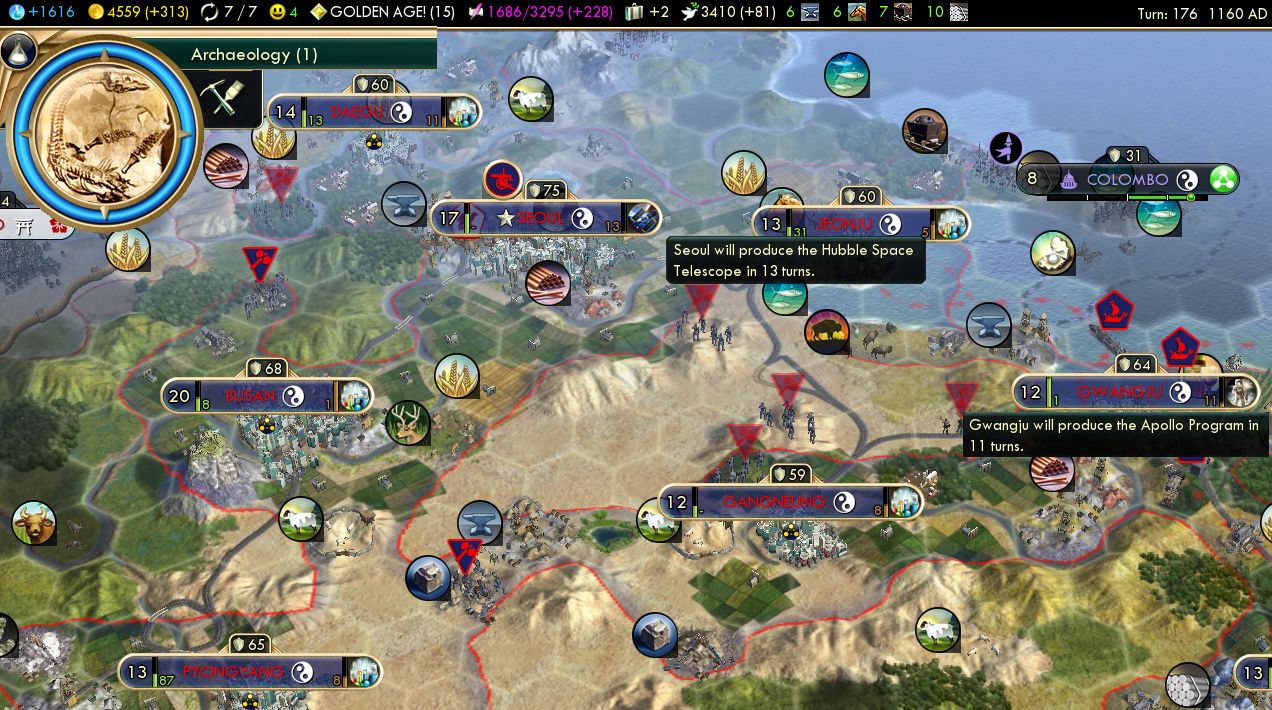
Anyway, I bulbed 3x to reach Rocketry on turn 176 plus the Rationalism finisher for Satellites. This was as fast as I could have reached them because that third scientist (7th total) spawned just this turn. I had alertly planned ahead to rig up a second strong hammer producer, Gwangju with sea trade routes for production, to build Apollo and Hubble in parallel. The limiting factor from here is Hubble and bulbing those scientists to complete the tech tree. All the SS parts should be instabought via Space Procurements...
...if we could get the money. I couldn't actually find online how much SS parts cost; none of the wikis or info repositories bother to write down the purchase cost or remember that SS parts count as units. But I found the formula: (30 × hammers)0.75 = 3089, modified by rounding and Mercantilism and Big Ben to 1830. This means the entire ship costs a total of 1830 × 6 = 10980 gold. That's a LOT, of course. I have 4500 saved in this picture here, but still need 6500 more. Actually I'm just on track to exceed that, with 4000 income coming over those 13 turns, about 1000 available from AI loans, and 2000 from selling out all my buildings (labs, schools, universities, aqueducts, gardens, even monuments after the last policy.) I felt I could spare just enough for a factory at Seoul here, to save two turns on Hubble to synch it with Apollo, and also get 8 more specialist beakers from the engineers.
And I was running four scientists short at endgame: the first early spawn of an engineer instead of a scientist; spent one more than usual before Plastics; no Spaceflight Pioneers; and only two from faith instead of the usual three.
That last was a big deal. It happened because I didn't get to carry much faith into the industrial age to use towards great people. I only had 300 this time, where optimal is usually to come in just under the 800 prophet. Because it had taken a while to buy all the pagodas at 300 each after entering the renaissance early. And it would turn out that missing that scientist cost me probably three turns.
On turn 184, 3 turns before Hubble, would have been the optimum time to start spending the last 7 or 8 scientists to burn the overflow each turn. But the total value of the 7 scientists would fall a bit short. The underlying problem was that the last few labs hadn't completed until around turn 180, so I had to wait a bit longer until their production filled the 8-turn historical window. The bulb value was climbing by 500 per turn, which is a lot. On turn 184 the value was 13300 and I needed to average 15300 for each of the 7 scientists. So I had to wait a bit longer for the bulb value to come up.
Hubble completed on turn 187, and with those scientists I now had enough beakers to cover the entire tech tree. But that was a total of 10 techs remaining at this point, and 7 scientists can only claim 7 techs, so I needed three more end-turn cycles to process their overflow into three more actual techs. (The overall picture is that I could have saved those three turns either with the third faith scientist or by getting the labs done sooner.)
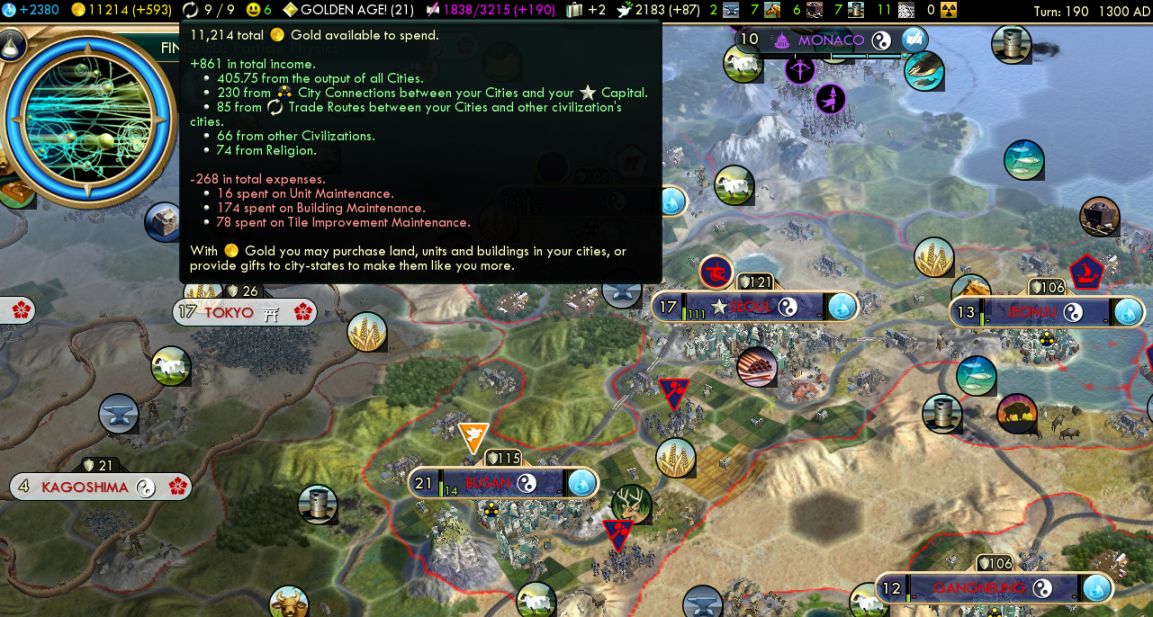
Anyway, here we are on turn 190, the last techs finally bulbed and Oxforded. And look at that income number! 593 gold/turn is a record. I didn't know income could get that high. Turns out that trading posts really do add up with long Golden Ages. I pushed hard to keep building them after railroads (with the Liberty worker speed helping considerably) and they paid off. I also took care to delete obsolete units and even workers right at the end to stop paying for them.
So there's the 11k gold to buy all the parts. I didn't even have to sell my buildings or take AI loans. So I could have bought another research lab or two earlier on and probably had the scientists at enough value to finish the tech tree three turns sooner.

I got all the spaceship parts on T190 once again, exactly the same as my Shoshone and Spain games, and five turns behind my Babylon and Poland records. It takes a turn after purchasing until they can move to the capital, so the victory is officially turn 191.
I honestly don't know where this result should have come in. I really don't know if Korea should be strong enough to match Babylon and Poland. And if it is, I don't know where I lost that margin among the variables of going Liberty or the weak capital or late aqueducts or Freedom or the lategame snags. I suppose this requires more experimentation...